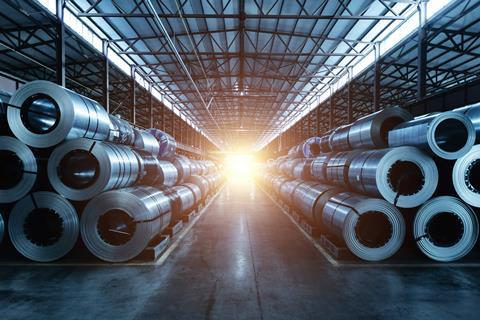[Updated March 13] The decision by Trump to impose tariffs on European imports of the metals, affecting more than €8 billion-worth of EU exports, adds to tariffs on other exports worth €18 billion.
US tariffs of 25% on global steel and aluminium imports went into force on Tuesday (March 11), further stoking an all-out trade war as the Trump administration continues its protectionist policy of promoting local production at the risk of higher consumer prices and reduced trade. That now includes boosting steel and aluminium prices and benefiting US producers.

On Tuesday Trump also announced that imports from its immediate neighbour Canada would double to 50% but in the same day rolled back the increase to 25% following Ontario’s move to suspend its own levy on electricity exports.
The US tariffs of up to 25% will apply on industrial-grade steel and aluminium, other steel and aluminium semifinished and finished products, and also their derivative commercial products (including machinery parts). For Europe that covers up to €26 billion ($28.3 billion) worth of exports to the US.
The American Automotive Policy Council (AAPC), which represents the interests of Ford, GM and Stellantis in North America, expressed concern about the impact on manufacturers and consumers.
“With our deep American roots and the steel and aluminium content requirements of the USMCA, Ford, GM and Stellantis purchase the vast majority of their steel and aluminium in the United States or North America,” said Matt Blunt, president of AAPC. “We are still reviewing and awaiting all of the details of the tariffs, but revoking the exemption for Canada and Mexico and extending tariffs to auto parts with steel and aluminium will add significant costs for automakers, suppliers and consumers.”
The US-based Vehicle Suppliers Association (Mema) said that it is concerned that ”ending supply agreements with allied nations and the immediate sunset of the exclusion process will hinder the industry’s ability to secure essential materials”. Mema said that raised concerns for vehicle suppliers relying on North American trade integration for cost stability and supply chain efficiency.
European countermeasures
The decision by Trump to impose tariffs on European imports of the metals, affecting more than €8 billion-worth of EU exports, adds to tariffs on other exports worth €18 billion. Under Section 232 of the Trade Expansion Act, the president of the US can impose import restrictions, including tariffs, if imports are deemed a threat US national security. The move drew an immediate response from the European Commission, which announced countermeasures that will take effect in April that apply to US goods worth up to €26 billion.
“The trade relations between the European Union and the US are the biggest in the world,” said Ursula von der Leyen, president of the EC on Tuesday. “They have brought prosperity and security to millions of people, and trade has created millions of jobs on both sides of the Atlantic. As of this morning the United States is applying a 25% tariff on imports of steel and aluminium. We deeply regret this measure. Tariffs are taxes. They are bad for business, and even worse for consumers. These tariffs are disrupting supply chains.”
The EC countermeasures will be applied in two stages. On April 1 the EC will reintroduce measures to rebalance trade previously taken between 2018-2020, in response to Trump’s previous tariffs on European steel and aluminium. They included countermeasures on €2.8 billion of US exports to the EU in 2018. Following discussions with the US on tariff-based quota system for EU exporters, the EU suspended these original measures until March 31, 2025 to give space for the parties to work out a longer-term solution. That will now lapse. On April 13 it will levy additional duties targeting €18 billion of goods from the US to the European bloc, including motorcycles, bourbon, peanut butter and jeans.
In the meantime, the EC remains open to negotiation with the US, said von der Leyen. “We firmly believe that in a world fraught with geopolitical and economic uncertainties, it is not in our common interest to burden our economies with tariffs,” she added.
Rolled steel imports
According to the Council on Foreign Relations (CFR), US domestic steel mills produce roughly three-quarters of what the country needs. However, industries including automotive, aerospace, energy and construction, rely on foreign sources for specific types of steel that can withstand extreme temperatures and pressures. The US imports around 40% of its piping and other rolled steel materials, and the added tax would drive up costs for US companies, said the CFR. In January, then-president Biden blocked the $14.9 billion takeover of US steel by Japanese supplier Nippon, citing national security concerns.
Dependency on imports of aluminium to the US is higher, with about half the US aluminium imported. Roughly two-thirds of primary aluminium comes from Canada, according to the Aluminium Association, where lower energy costs make it cheaper to produce.
At last month’s Wolfe Research Auto, Auto Tech and Semiconductor Conference, Ford’s new chief financial officer, Sherry House, said that directly Ford got 90% of its steel from US producers and aluminium is “not that competitive” for the company. However, CEO Jim Farley pointed out that Ford’s suppliers have international sources for both metals and that impact would be felt in the price of parts, all part of the “cost and chaos” of a tariff war.
Impact on suppliers
Earlier this month Mema said that 25% tariffs on imports from Canada and Mexico, and from China and Hong Kong, created a significant risk to vehicle suppliers.
“The community of vehicle suppliers remains fragile from years of industry volatility, workforce shortages, supply chain disruption and the pandemic,” said Bill Long, president and CEO of Mema. “Tariffs of this scale place a significant burden on US manufacturers, increasing costs, reducing profitability, impacting American jobs and the industry’s ability to compete globally.”
The association cited one of its recent surveys of the industry which showed that 82% of suppliers said tariffs on goods from Mexico will have a negative effect on their businesses, while 68% said tariffs on goods from Canada would also harm operations. During the first month of tariffs, suppliers canvassed anticipated cutting or delaying investments (24%), modifying supply chains (21%) and cutting US jobs (13%).
Another Mema survey completed by completed by 139 supplier members, including original equipment and aftermarket suppliers across both the light vehicle and commercial vehicle sectors, found that more than 80% of them were exposed to steel and aluminium derivative tariffs, with more than a third facing tariffs on both the material they import for local production and the products they deliver.
Amongst other findings from the survey were:
-
78% of supplier respondents are exposed to steel tariffs, while 63% are exposed to aluminum tariffs
-
97% of supplier respondents expressed concerns about increased distress among sub-tier suppliers because of the announced tariffs
-
78% of suppliers reported that they do not have excess available capacity in the US to domestically manufactured parts currently sourced through global supply chains.
“As an industry, we recognise the importance of strong domestic supply chains,” said Long. “At the same time, it is essential that trade policies allow suppliers to remain competitive in a global market. We continue to engage with policymakers to ensure these considerations are part of the broader discussion on economic growth and job creation.”
US election: A timeline of impacts on automotive logistics
- 1
- 2
- 3
- 4
- 5
- 6
- 7
- 8
- 9
- 10
- 11
- 12
 Currently reading
Currently readingUS to impose global tariffs of 25% on steel and aluminium imports; European Commission announces retaliatory levies
- 13
- 14
- 15
- 16
- 17
- 18
- 19
- 20
- 21
- 22


























![Global[1]](https://d3n5uof8vony13.cloudfront.net/Pictures/web/a/d/s/global1_726550.svgz)
































No comments yet